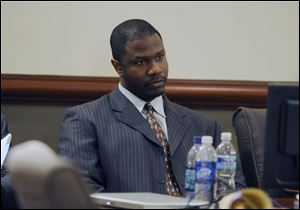
Atlanta jury convicts courthouse slayer
11/7/2008
Brian Nichols waits for jurors to file into the Atlanta courtroom Friday. He was found guilty in the slayings of 4 people.
ATLANTA The shooting rampage began when Brian Nichols overpowered a deputy, stole her weapon, and burst into a courtroom where he shot a judge and court reporter dead.
Soon he had slain another deputy, a federal agent, and stole a car, plunging the city into deep fear and horrifying the country on a day locals would long remember as simply the rampage.
He then took another woman hostage, holing up in her apartment and using her drugs before surrendering to authorities the next morning.
But it wasn t nearly over: Efforts to bring the 36-year-old to justice would stretch for more than three years, draining millions of dollars and frustrating victims families.
Finally, on Friday, jurors found Nichols guilty of murder and a host of other charges in a packed courtroom around the corner from where the notorious shootings took place.
The facts of the case were never in doubt Nichols confessed to the killings but he claimed he was gripped by a delusional compulsion that he was a slave rebelling against his masters.
The jury rejected that argument, finding him guilty of all 54 charges against him, including felony murder, aggravated assault, false imprisonment, and armed robbery. The jurors will now debate whether he deserves capital punishment.
The murder in the court enveloped the city with a sense of dread, as residents heard minute-by-minute accounts of the crime and urgent pleas from authorities to stay vigilant. It also shook the justice system, leaving attorneys and judges to question their safety and forcing courthouses around the state to re-examine security.
The crimes unfolded on March 11, 2005, when Nichols took the weapon of the deputy escorting him to the courtroom where he was on trial for rape. He then fatally shot Superior Court Judge Rowland Barnes and court reporter Julie Ann Brandau in quick succession.
He killed Deputy Hoyt Teasley, who was responding to a distress call, on a busy street outside the courthouse and then escaped Atlanta in a stolen car. He managed to evade the hundreds of police officers searching for him through the night, a massive manhunt that dominated the nation s news.
He headed for Atlanta s posh Buckhead neighborhood, where he shot and killed federal agent David Wilhelm outside the house he was renovating. Seeking a safe retreat, Nichols then went to suburban Gwinnett County, where he took Ashley Smith Robinson hostage and kept her captive through daybreak.
He was only captured when Ms. Smith Robinson alerted police of his whereabouts, turning her into an instant celebrity. She was credited with bringing a peaceful end to the rampage by, in her account, appealing to his religious beliefs and giving him illegal drugs from her hidden stash.
I said whatever was necessary to get on his good side, I guess, she testified in court last month.
Seeing the case to trial alone was a success of sorts. Since Nichols arrest three years ago, the trial has been delayed by a series of complications that have outraged a community seeking closure.
Nichols had been accused of plotting an escape from jail with his pen-pal girlfriend. Lawmakers furious at a defense bill that tops $1.8 million have used the trial as a rallying cry to cut funding to Georgia s fledgling public defender system.
And the district attorney sued the presiding judge, Hilton Fuller, who later stepped down after he was quoted as saying of Nichols, everyone in the world knows he did it.
The new judge, James Bodiford, has won praise for keeping the trial on track since jury selection began in July. In six weeks of testimony, the panel has since heard from more than 90 witnesses and seen more than 900 pieces of evidence.
But the trial wasn t without problems. Willie Tiller, Jr., a former Nichols cellmate at the Fulton County Jail, was badly beaten by other inmates after they discovered he was a prosecution witness who testified that Nichols plotted the judge s killing.
A few days later, Judge Bodiford was forced to dismiss a juror who had told at least two other jurors about Mr. Tiller s jailhouse beating after hearing news reports of the attack. Loose lips sink ships, the judge said before dismissing the juror.
In the end, Nichols attorneys banked their hopes that a jury would find him not guilty by reason of insanity, or at the very least guilty but mentally ill, a rare sentence that would require the courts to evaluate Nichols and mete out his punishment.
Look at the evidence and weigh it with fairness, defense attorney Josh Moore urged the jury. It s going to take courage, but we know at the end of the day you will come to a just conclusion.
Prosecutors stuck firm to their arguments that Nichols concocted the argument to spare his life.
It didn t have anything to do with insanity or delusion. The defendant was angry and he was frustrated, said Clint Rucker, a Fulton County prosecutor. He is conniving, he is cold-blooded, he is vicious, he is remorseless, and he is extremely, extremely dangerous.